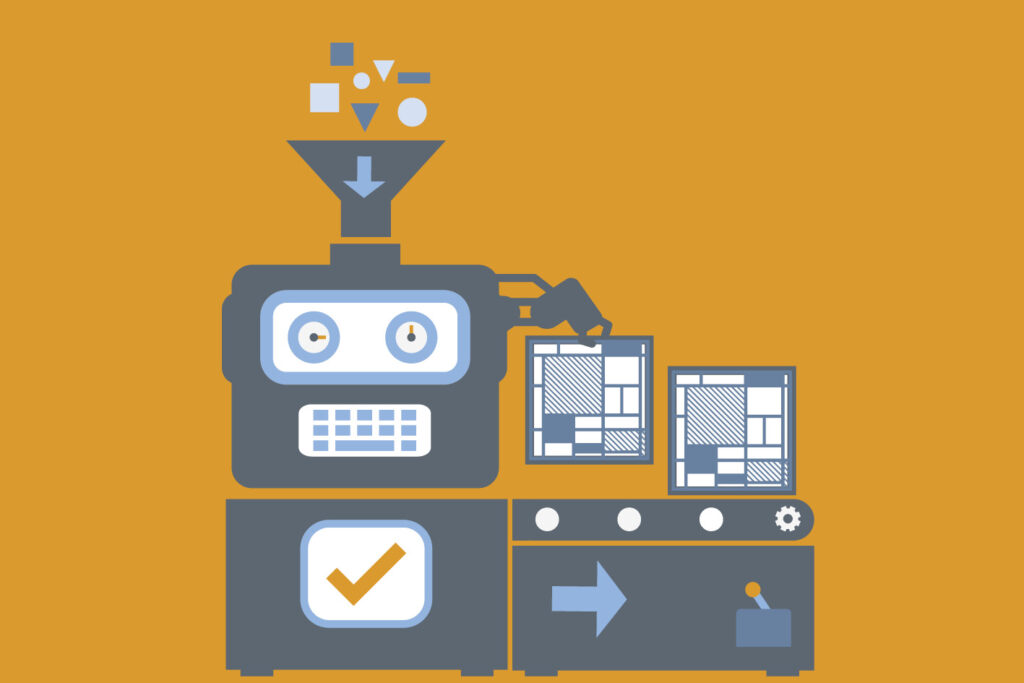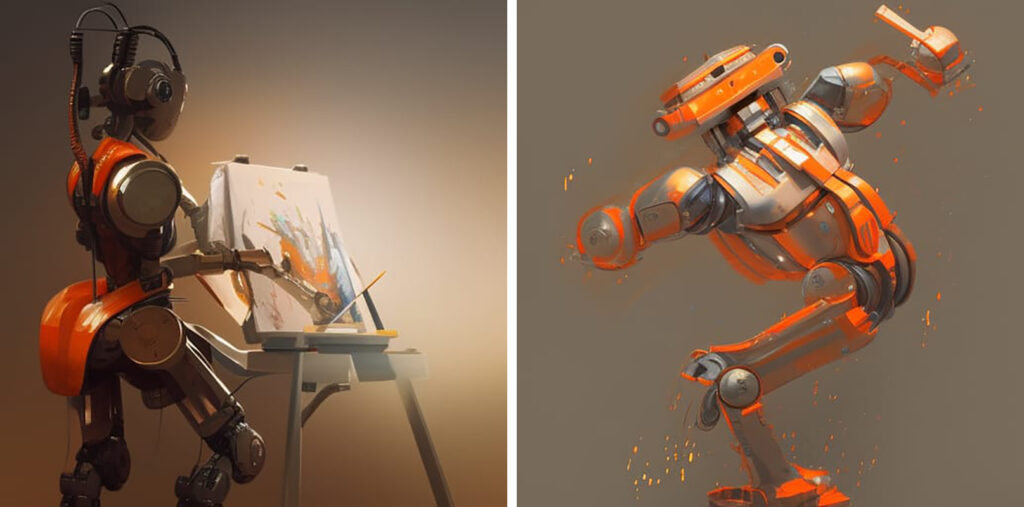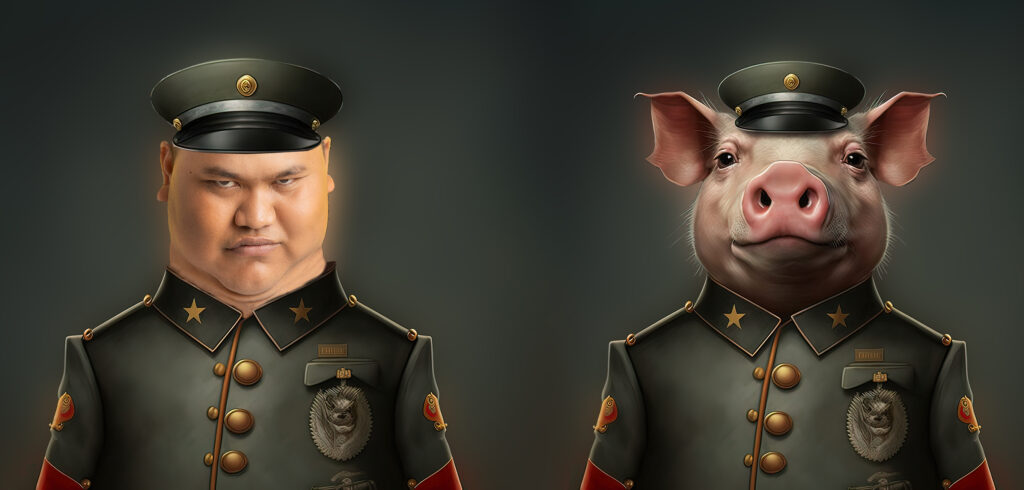
Watch out artworld, the rise of the robots is upon us!
Rise of the robots! what’s the issue? Well… AI (Artificial Intelligence) generated artwork seems to be creating a storm of controversy at the moment, and the big question asks whether it is just a reflection of the ever evolving modern world and should be embraced or is it something that ‘traditional’ artists should be concerned about? Are we witnessing the death of artistry.
In this article I have chosen to focus on visual art and AI Image Generators. However, as many people better qualified than me are aware, AI Chat bots are also on the rise, threatening the writers’ livelihoods with cheap, instant content generation. Chat bots have no morality, so there are major issues of high-tech plagiarism, exam cheating etc but these are thoughts for another day and I’ll leave you with this – Can machines become poets? Discuss.
Algorithms don’t feel, data doesn’t suffer
Nick Cave, Song Writer and Author
There has always been passionate debate surrounding the introduction of shiny new tools for creating art, photography being the first to challenge the status quo in the early 19th Century. The revolutionary camera quickly asserted itself on the battlefield and took over many of the traditional realism domains of the painter, in particular portraiture. Charles Baudelaire, the 19th-century French poet and art critic, called photography “art’s most mortal enemy.” Artists were now fighting on the back foot but this challenge turned into a victory as it encouraged them to seek new ways of expression, and was a major catalyst in the development of the Modern Art movement. It’s clear that artists have always had an uncomfortable relationship with new technology (I generalise of course) and this mindset continues today, many condemning work created with computers and digital editing tools for being too ‘easy’, lacking real skill and emotional content. Ouch !
We’re charging our battery
And now we’re full of energy
We are the robots
We are the robots
We are the robots
We are the robots
We are programmed just to do
Anything you want us to
Kraftwerk, The Robots

Lack of real human contribution raises big questions with these cyber creations. Art is normally considered as the product of an artist’s imagination, experience, skill and importantly an overriding need to emotionally express themselves. However, AI technology is compelled only by commands, allowing rank amateurs to create stunning, complex images by simply typing a series of words into a text box, and then – voila! the App spits back an image seconds later. And just to arm you with a little jargon, turning text into custom images is known as ‘diffusion’. Clever I know but is it a valid artistic process? These are the 3 simple steps most Apps use:
- Imagine anything you like, describe in a few words, type it into the search bar. Click Generate.
- AI bot generates a few versions for you to select from.
- License and download.
Simple as that!
So why are these new AI tools perceived as a threat?
Artists are understandably nervous about their own futures, in particular, illustrators and animators — why would anyone pay for authentic, artist-created art, when they could almost instantaneously generate cheap content themselves. Why bother spending time and money commissioning a human to do the job?
There is unquestionably a contradiction between an efficient technological machine and the flowering of human nature, of the human personality
Arthur Miller, Author
Remember when every office amateur armed with a digital camera suddenly became Mr/Mrs point and shoot expert! This impacted greatly on the market for commissioning professional photographers and the threat to the livelihood of visual artists is similar.
Critics believe that it’s not simply the fact that these Apps can easily create stunning works of art with minimal or indeed no human input but rather how they work to accomplish this. AI generator Apps like Midjourney work by harvesting millions of images from the web, then teaching complex algorithms to recognise relationships and patterns which in turn generate new images in the same style. Easy peasy! This process is both ethically dubious and clearly an infringement of copyright laws. Ironically, stealing content and style from the artists who upload their unique artwork to the Internet are unwittingly helping to feed and train these predatory algorithms.
On the other side of the copyright issue, there was a recent legal case where a business man tried to get ownership and secure copyright on an AI artwork. The copyright was denied. Quoting from the 2021 Compendium of US Copyright Office Practices – works produced by a machine or mere mechanical process’ which operate ‘without any creative input or intervention from a human author’ are not protected by copyright.
There is also a heated debate around Disclosure when people submit art to art competitions for example, without disclosing that it was AI generated. Should this be a moral or indeed legal obligation? You decide.
There’s no question that AI-generated art devalues illustration
Rob Biddulph, Author and Illustrator
As there are adverseries to this technology there’s also a strong artist fan base, with many excited about the opportunity and benefits the new AI art technology offers.
Here’s a few counter opinions:
“Digital art is a modern medium and simply a reflection of contemporary society”
“Art is art, if it is good and relevant, does it really matter whether it’s a machine or person that created it.”
“Conceptual art, readymades and photography are widely accepted, why not digital art?”
“These digital tools are empowering and allow people with limited or no physical use of their body the opportunity to express what they’re feeling”
So what’s my view?
Time to come off the fence and voice my own opinions on this divisive topic. I straddle two camps as both a graphic designer and old school painter and sculptor. Who said men can’t multi-task! To be a designer I must of course embrace new technology and attempt to keep up with this ever advancing industry. However, when I slip on my messy painting clothes and slip out my clean digital mindset everything changes. I use computer technology only in a very limited way, perhaps just to experiment with different compositional possibilities before I commit the sketch to the virgin canvas. Personally speaking, nothing can replace the human struggle on canvas where there are no miraculous multi-undo buttons to salvage the work should it go astray. The smell of the paint, the meditative action of the brushstrokes all combine to create a sensory experience that is so unlike the more clinical digital approach.
At this rate with how fast technology is evolving, everything created by a human should be considered as something divine. Soon a human thing will be a rare thing!
Greg Rutkowski, Artist
I worry about where this AI revolution is going, where original human, messy, tactile art is replaced by a polished product and a machine based DIY process that anyone can use. Simply pressing a button to generate an image, in my humble opinion is not a creative process. I also have big unanswered questions on ethics, disclosure and copyright issues associated with the new art-making technologies. Most of all I fear people stop seeing the worth in recognising what’s real and instead embrace just what’s quick and clever to decorate their walls and match their curtains or indeed what’s cheaper to illustrate their publications. These are early days but as the intelligent machines get smarter it will no doubt become harder and harder to tell the difference that separates the artistic work from the machine product. There’s little doubt that AI image generation is here to stay, we can’t put the toothpaste back in the tube unfortunately, but we can stop squeezing it! No need to hit the panic button but let’s keep an eye on it, there’s a dystopian feel to what’s unfolding. Watch this space.
“The creatures outside looked from pig to man, and from man to pig, and from pig to man again; but already it was impossible to say which was which.”
George Orwell, Author, Animal Farm


